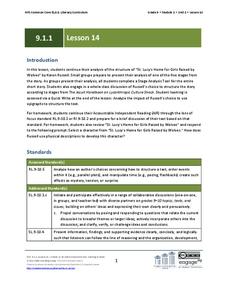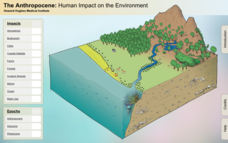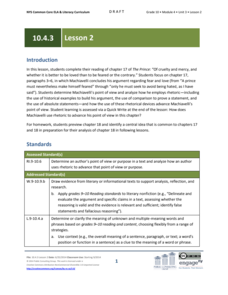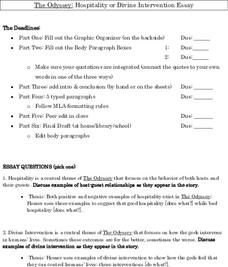Google
Advanced 4: Searching for Evidence for Research Tasks
Research was very different in the past. Pupils once had difficulty finding sufficient information, but now they have the opposite problem. Show your class how to pick the best resources out of the millions of sites an online search will...
EngageNY
Illustrating: Geography Icon
For the final step of the performance task for this unit, class members will create an illustration to go with the paragraph on their bookmark. After looking at models, guide pupils toward recognizing the criteria for an effective...
California Department of Education
Me and My Career
Your career search starts here! Sixth grade scholars begin their journey toward college and career readiness in the first of a five-part series of lessons. Individuals identify where their interests lead them using the Holland code, then...
Livaudais-Baker English Classroom
Heart of Darkness Active Reading Journal Assignment
Avoid the horror of readers straining to recall details of Joseph Conrad's complex Heart of Darkness. Instead provide scholars with a frame for their note taking. As they read, class members record evidence to support their responses to...
K5 Learning
Treasure Hunt
After reading about a book that leads two friends on a treasure hunt, class members respond to four short answer reading comprehension questions. Skills include describing the characters, retelling the story in their own words, writing...
New York State Education Department
TASC Transition Curriculum: Workshop 3
Teachers turning into students? It's not Freaky Friday! It's a thoughtful workshop that teaches participants how to plan professional development for staff. Third in a 15-part series, the workshop provides a platform for the other...
EngageNY
Mid-Unit Assessment: On-Demand Writing – Conflicting Interpretations of the 13th and 14th Amendments
The authors of the court's decision and the dissenting opinion on Plessy v. Ferguson disagreed on their interpretations of the Thirteenth and Fourteenth Amendments. Scholars set out to show how with an on-demand writing prompt. They...
Education Bureau of Hong Kong
Fundamentals of Critical Thinking
Analyzing arguments is key to critical thinking. Colorful slides teach viewers how to recognize the structure of an argument, the claims, and the validity of the evidence used to support an argument. Then, provided scenarios permit...
Newseum
Weighing the Arguments
To understand how personal perspectives can affect policy and politics, scholars examine the woman suffrage media map and historical artifacts to analyze arguments for and against women's suffrage. Class members then take on the role of...
C3 Teachers
Reparations: Why Are Reparations Controversial?
To understand why the topic of reparations is controversial, young scholars gather background information by reading articles, watching videos, and examining cases where reparations were made. Learners consider the lasting repercussions...
EngageNY
Grade 9 ELA Module 1, Unit 1, Lesson 14
Karen Russell's short story "St. Lucy's Home for Girls Raised by Wolves" has a unique structure that adds value to the story. With the fourteenth activity in a unit about literary analysis and textual support, analyze how Russell has...
EngageNY
Grade 9 ELA Module 4, Unit 1, Lesson 25
After analyzing the strengths and weaknesses of the evidence they have recorded on their argument outline tool, writers draft their essay's first body paragraphs, ensuring they have properly cited their source material.
Howard Hughes Medical Institute
The Anthropocene: Human Impact on the Environment
Will human existence define an epoch? Many scientists think we are in a new epoch, the anthropocene, defined by humans and our impact on the environment. An online interactive demonstrates the immense impact humans have had on every part...
Serendip
UV, Mutations, and DNA Repair
How effective are cells at repairing UV damage? An inquiry-based lesson has learners experiment with organism by exposing them to various levels of UV light and then examining their DNA after a period of time. Pupils test different...
College Board
2008 AP® English Language and Composition Free-Response Questions
Are your high school scholars ready for college?
Administering the 2008 AP® English Language and Composition Free-Response
Questions tells much about a
pupil's readiness for high level English courses. The resource offers three
questions...
EngageNY
Grade 10 ELA Module 4: Unit 2, Lesson 6
What decisions might an author make about the structure of a play? Pupils participate in an evidence-based discussion about Shakespeare's choices in Macbeth. Next, scholars analyze the effect of Shakespeare's structural choices in Act 2,...
EngageNY
Grade 10 ELA Module 4: Unit 3, Lesson 2
How do rhetorical devices advance an author's point of view? Scholars consider this question as they continue exploring Machiavelli's The Prince. They work in small groups, annotating the text for evidence of rhetoric before engaging in...
American Museum of Natural History
DNA Detective
DNA is like the fingerprint of genetics. A quick lesson introduces the topic of DNA sequences with a mystery about an endangered species. The lesson shows how DNA extraction, replication, and sequencing often provide undeniable evidence...
American Museum of Natural History
Keeping a Field Journal
Recording scientific evidence allows for important discoveries and conclusions. A remote learning resource outlines how to create a field journal to record scientific observations. The outline resource includes notation about the...
American Museum of Natural History
Fighting Dinos
A famous fossil of fighting dinosaurs holds as many questions as answers. Scholars first analyze the fossil itself by virtually highlighting the specific bones of the dinosaurs and read about their function and importance. They then test...
DocsTeach
Letter to President Abraham Lincoln from Annie Davis
What freed enslaved people? The answer, it turns out, is complicated. Using a set of online documents and writing prompts, young historians examine a series of primary sources, including a letter from a woman asking if she was freed and...
PBS
Investigating Daily and Seasonal Weather
Talking about weather isn't just for making conversation. Young scientists gather evidence from an interactive activity to make connections between daily and seasonal weather. They analyze data from different areas and compare the...
Curated OER
The Odyssey: Hospitality or Divine Intervention Essay
Conclude a study of The Odyssey with a writing assignment that asks readers to investigate a central theme in Homer's tale. Scholars either provide positive and negative examples of hospitality or look for evidence of how the gods...
Newseum
Things Change, Things Stay the Same
Securing women the right to vote was a long time coming. Over the years, some aspects of the suffrage movement changed, and some things remained the same. Pupils research three time periods and collect evidence of key people,...

























